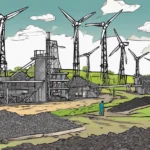Agriculture is the backbone of Uttar Pradesh, contributing significantly to both the state’s economy and the livelihoods of millions of people. With approximately 80% of its population residing in rural areas, agriculture remains a central pillar of Uttar Pradesh’s socio-economic structure. However, the state’s agricultural practices have come under increasing scrutiny due to their environmental impact, ethical concerns, and long-term sustainability. As Uttar Pradesh grapples with these issues, the ethical questions surrounding agriculture are becoming more critical, prompting philosophical reflections on how agricultural practices can align with both human and environmental welfare.
The Importance of Agriculture in Uttar Pradesh
Uttar Pradesh, with a population of over 220 million, is one of India’s leading agricultural states. It produces significant quantities of wheat, sugarcane, rice, and vegetables. As per the Uttar Pradesh Economic Survey 2022-23, agriculture accounts for nearly 24% of the state’s Gross State Domestic Product (GSDP). Uttar Pradesh is the largest producer of sugarcane in India and ranks second in rice production, making it crucial not only for the state but for the national economy as well.
However, despite its critical role, the sector faces numerous challenges, including over-dependence on water resources, high pesticide usage, and poor soil health, which raise concerns about the ethical implications of current agricultural practices.
Ethical Challenges in Uttar Pradesh’s Agricultural Sector
From a philosophical perspective, the ethical questions surrounding agriculture in Uttar Pradesh revolve around the balance between economic gain and environmental sustainability. Issues such as pesticide overuse, water wastage, and monoculture farming create long-term risks for both the environment and human health.
The use of chemical fertilizers and pesticides has been a longstanding concern. According to the Ministry of Agriculture and Farmers’ Welfare, India uses around 1.5 million metric tons of pesticides annually, with Uttar Pradesh accounting for a significant portion of this usage. Excessive pesticide use not only harms the environment but also affects the health of farmers and consumers alike. The ethical dilemma here involves weighing the short-term benefits of increased crop yields against the long-term health risks associated with pesticide residue in food and water.
Similarly, water usage in agriculture is a significant issue. Uttar Pradesh has been grappling with water scarcity, particularly in regions like Bundelkhand, where farmers rely heavily on groundwater for irrigation. According to the Central Ground Water Board (CGWB), groundwater depletion in Uttar Pradesh has reached alarming levels, with many areas now classified as ‘over-exploited.’ The ethical question arises: should farmers continue practices that drain the state’s water resources for the sake of higher yields, or should there be a shift towards more sustainable farming techniques?
Philosophical Approaches to Ethical Agriculture
Philosophy offers several frameworks to address these ethical challenges. Utilitarianism, a principle popularized by philosophers like John Stuart Mill, can be applied to agriculture by advocating for practices that maximize overall well-being. This might involve prioritizing sustainable farming practices that benefit both the environment and society, such as organic farming and rainwater harvesting. The long-term benefits of preserving soil health and reducing pesticide use would result in better outcomes for both farmers and consumers, aligning with the utilitarian goal of maximizing happiness and minimizing harm.
On the other hand, the principles of environmental ethics argue that nature has intrinsic value, independent of human use. This view suggests that the exploitation of natural resources, such as water and soil, for profit-driven agricultural practices is morally wrong. From this perspective, ethical agricultural practices would require a shift toward resource conservation and sustainable farming methods that respect the environment’s autonomy.
The philosophy of virtue ethics, which emphasizes the development of good character traits, could also be instrumental in shaping ethical agricultural practices in Uttar Pradesh. By fostering virtues such as responsibility, care, and prudence, farmers and policymakers could cultivate a culture of sustainable farming that prioritizes long-term ecological health over short-term economic gains.
Government Initiatives Toward Ethical Agriculture
Recognizing the importance of ethical and sustainable farming, the Uttar Pradesh government has taken several steps to promote better agricultural practices. The Uttar Pradesh Agricultural Policy 2022 emphasizes sustainable agricultural techniques, including organic farming, precision farming, and water conservation practices. The government is also promoting Zero Budget Natural Farming (ZBNF), which aims to reduce dependency on chemical inputs and encourage environmentally friendly farming methods.
Additionally, the state has launched initiatives like the National Mission for Sustainable Agriculture and Pradhan Mantri Krishi Sinchayee Yojana (PMKSY) to improve irrigation efficiency and conserve water resources. These efforts are in line with the philosophical notion of sustainability, addressing both the environmental and ethical concerns of modern agriculture.
Conclusion
The ethical dimensions of agricultural practices in Uttar Pradesh are complex, involving considerations of economic growth, environmental sustainability, and social justice. As the state continues to evolve, it is clear that integrating philosophical perspectives into agricultural policy and practice could help create a more sustainable and ethically responsible agricultural sector. With the government’s commitment to promoting ethical farming and the adoption of sustainable practices, Uttar Pradesh has the potential to lead the way in balancing economic success with environmental stewardship, paving the way for a more equitable and sustainable future for its farmers and citizens alike.


























